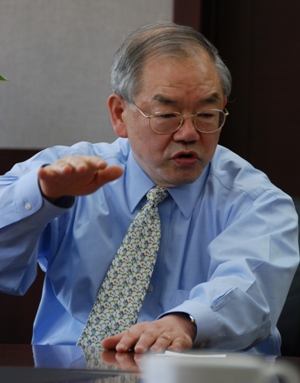event
KAIST attended the World Economic Forum’s “Summer Davos Forum” held from September 13 to 15 in Tianjin, China. The Summer Davos Forum hosted various sessions and meetings with international dignitaries from governments, business and public organizations, and academia on the main theme of “Driving Growth through Sustainability.”
On September 14, four subjects including “Electric Vehicles,” “Humanoid Robotics,” “Next Generation of Biomaterials,” and “New Developments in Neuroengineering” were presented by KAIST, followed by discussions with forum participants.
Professor Jae-Seung Jeong of the Bio and Brain Engineering Department, Sang-Yup Lee of the Chemical and Biomolecular Engineering Department, Joon-Ho Oh of the Mechanical Engineering Department, and President Nam-Pyo Suh participated in the forum as presenters of the topic. Of these speakers, Professors Jae-Seung Jeong and Sang-Yup Lee were nominated by the World Economic Forum (WEF) as members of the “Young Global Leader” and “Global Agenda Council on Emerging Technologies,” respectively.
President Suh was also invited to the CEO Insight Group and delivered an opening speech on OLEV (Online Electric Vehicle) and the Mobile Harbor. President Suh plans to sign an MOU for research cooperation with Jong-Hoo Kim of Bell Lab and Shirley Jackson of the Rensselaer Polytechnic Institute in the near future, respectively.
Since 2007, the WEF, in charge of the world’s largest international conference called “Davos Forum” has hosted a “Summer Davos Forum,” also called as the “Annual Meeting of New Champions.” The Summer Davos Forum consists of nations, rising global companies, next generation of global leaders, and cities or nations that lead technological innovations. Unlike the annual Davos Forum held in January, the “Annual Meeting of New Champions” is held in September of each year in Tianjin and Dalian, China.
Since 2009, the WEF has added a special session called IdeasLab in the Davos and Summer Davos Forums. Through IdeasLab, prominent universities from all over the world, research organizations, venture businesses, NGOs, and NPOs are invited to exchange and discuss innovative and creative ideas that can contribute to the development of mankind. Until now, universities including INSEAD, EPFL-ETH, MIT, Oxford, Yale, Harvard, Rensselaer Polytechnic Institute, Tsinghua University, and Keio University have been invited to the IdeasLab. KAIST is the first Korean university to attend this session.

-
event 'Team Atlanta', in which KAIST Professor Insu Yun research team participated, won the DARPA AI Cyber Challenge in the US, with a prize of 5.5 billion KRW
<Photo1. Group Photo of Team Atlanta> Team Atlanta, led by Professor Insu Yun of the Department of Electrical and Electronic Engineering at KAIST and Tae-soo Kim, an executive from Samsung Research, along with researchers from POSTECH and Georgia Tech, won the final championship at the AI Cyber Challenge (AIxCC) hosted by the Defense Advanced Research Projects Agency (DARPA). The final was held at the world's largest hacking conference, DEF CON 33, in Las Vegas on August 8 (local time)
2025-08-10 -
event Prof. Seungbum Koo’s Team Receives Clinical Biomechanics Award at the 30th International Society of Biomechanics Conference
<(From Left) Ph.D candidate Jeongseok Oh from KAIST, Dr. Seungwoo Yoon from KAIST, Prof.Joon-Ho Wang from Samsung Medical Center, Prof.Seungbum Koo from KAIST> Professor Seungbum Koo’s research team received the Clinical Biomechanics Award at the 30th International Society of Biomechanics (ISB) Conference, held in July 2025 in Stockholm, Sweden. The Plenary Lecture was delivered by first author and Ph.D. candidate Jeongseok Oh. This research was conducted in collaboration with P
2025-08-10 -
event KAIST’s Wearable Robot Design Wins ‘2025 Red Dot Award Best of the Best’
<Professor Hyunjoon Park, M.S candidate Eun-ju Kang, Prospective M.S candidate Jae-seong Kim, undergraduate student Min-su Kim> A team led by Professor Hyunjoon Park from the Department of Industrial Design won the ‘Best of the Best’ award at the 2025 Red Dot Design Awards, one of the world's top three design awards, for their 'Angel Robotics WSF1 VISION Concept.' The design for the next-generation wearable robot for people with paraplegia successfully implements functional
2025-08-09 -
research KAIST Develops ‘Real-Time Programmable Robotic Sheet’ That Can Grasp and Walk on Its Own
<(From left) Prof. Inkyu Park from KAIST, Prof. Yongrok Jeong from Kyungpook National University, Dr. Hyunkyu Park from KAIST and Prof.Jung Kim from KAIST> Folding structures are widely used in robot design as an intuitive and efficient shape-morphing mechanism, with applications explored in space and aerospace robots, soft robots, and foldable grippers (hands). However, existing folding mechanisms have fixed hinges and folding directions, requiring redesign and reconstruction every ti
2025-08-06 -
event Key Figures in the Establishment of KAIST, Specially Invited to the Presidential Office’s National Appointment Ceremony
KAIST announced on August 6 that Professor Emeritus Jung-Woong Ra from the Department of Electrical Engineering and Won-ki Kwon, former Vice Minister of the Ministry of Science and Technology, who played pivotal roles in the establishment of KAIST, were selected as special guests for the 'National Appointment Ceremony' hosted by the Presidential Office on August 15th. The Presidential Office selected special invitees across eight categories for the ceremony. These include individuals born in
2025-08-06